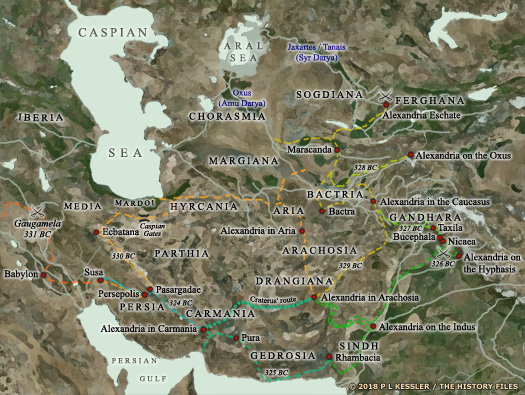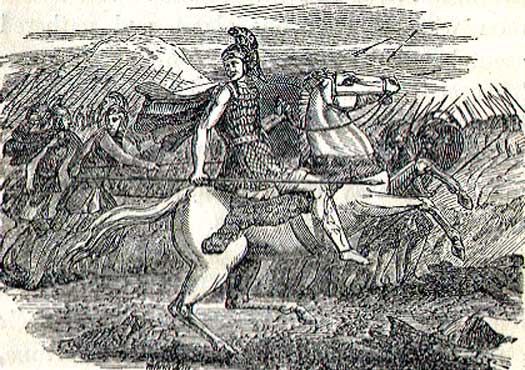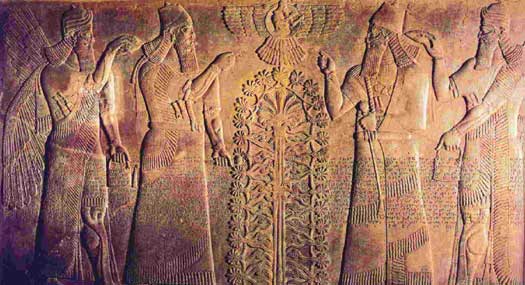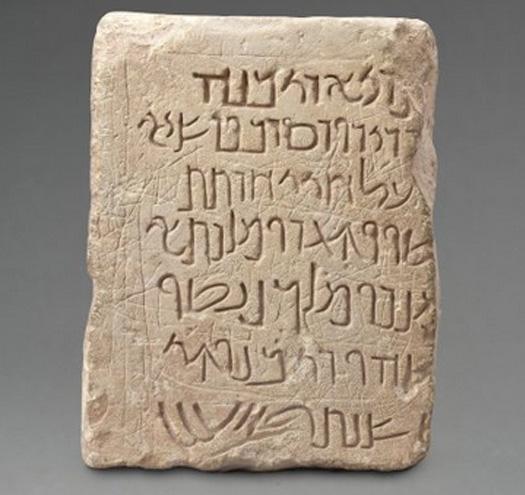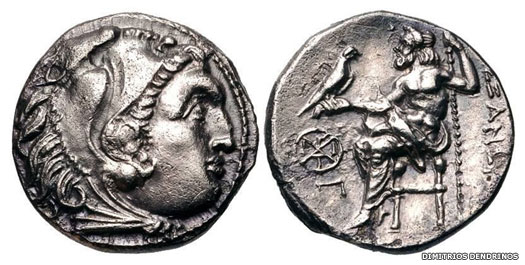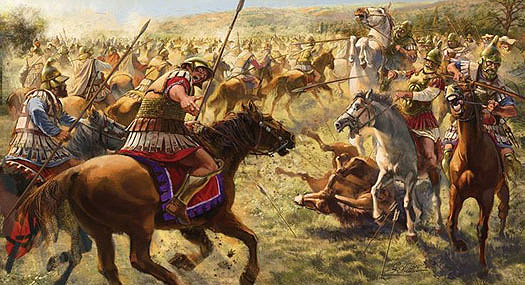
| ANTIGONID (HELLENIC) 306 - 277 BC :
The Hellenic empire was created by Alexander the Great, king of Macedonia, in his conquests between 334-326 BC. Essentially it encompassed all of the territory that was now under Macedonian control, from Greece to India, and was the largest empire that the world had seen at the time. Alexander rarely paused in extending its borders, especially eastwards even though his army felt that enough was enough and forced an about-turn. The unexpected death of Alexander in 323 BC changed the situation dramatically.
Immediately his generals divided the empire between them, all the while paying nominal allegiance to the regent and Alexander's puppet successor. Antigonus was already satrap (governor) of Lycia and Pamphylia upon Alexander's death, but lost Greater Phrygia at the settlement of territories in 323-322 BC. A new agreement in 320 BC kept him in command of Lycia and Pamphylia, to which was added overlordship of Lycaonia, Syria and Phoenicia, making him commander of the Asian section. His main task was to defeat Eumenes as the successional Wars of the Diadochi (the 'successors, Alexander's generals) opened up, with Eumenes and the regent, Perdiccas, being part of the opposition at that point. Ptolemy was unassailable in Egypt, Lysimachus retained Phrygia and Thrace, while the three subsequent murderers of Perdiccas - Seleucus, Peithon, and Antigenes - were given the former Persian provinces of Babylonia, Media, and Susiana respectively. Arrhidaeus, the former regent, received Hellespontine Phrygia. Paphlagonia was added to Antigonus' holdings in 316 BC.
Although he survived the first two Wars of the Diadochi, the third in 314 BC resulted because Antigonus himself had grown too powerful in the eyes of the other generals, having grabbed Babylonia, Bactria, and Northern Indus, plus everything in between. Clearly he was attempting to rebuild Alexander's empire in his own image, and the others felt they deserved to be that man. He was attacked by Ptolemy from his stronghold in Egypt, Lysimachus from Phrygia and Thrace, Cassander from Macedonia, and Seleucus who was temporarily exiled in Egypt. They came to terms in 311 BC after Antigonus had lost Babylonia to Seleucus. The fourth war ended in the death of Antigonus in 301 BC, but by then he had already established an independent Antigonid kingdom (in 306 BC). The other generals responded by proclaiming themselves kings in the following year.
In some ways the Greeks were their own worst enemy. Their culture bore some similarities with that of their Indo-European cousins, the Celts, in that they would seemingly fight anyone, especially each other. Partially symptomatic of a culture that did not especially set out laws and which did not especially respect any laws that were set out, Greek history is rife with rebellions, pretenders, and civil wars, so much so that towards the end of the Hellenic period they essentially self-destructed their surviving empires, effectively handing them over to Rome to replace them as the dominant force in the ancient world.
(Information by Peter Kessler, with additional information by Edward Dawson, from Jewish War & Jewish Antiquities, Flavius Josephus, from Alexander the Great: A Reader, Ian Worthington (Routledge, 2012), from Bibliotheca Historica, Diodorus Siculus, from Historiae Alexandri Magni, Quintus Curtius Rufus, from Anabasis Alexandri, Arrian of Nicomedia, from The Generalship of Alexander the Great, J F C Fuller, from the Historical Dictionary of Ancient Greek Warfare, J Woronoff & I Spence, from Who's Who in the Age of Alexander the Great: Prosopography of Alexander's Empire, Waldemar Heckel (Ed), from The Histories, Herodotus (Penguin, 1996), from The Persian Empire, J M Cook (1983), and from External Links: Encyclopædia Britannica, and Diodorus of Sicily at the Library of World History (dead link).)
Argead Dynasty in Asia Minor (Antigonids) :
The Argead were the ruling family and founders of Macedonia who reached their greatest extent under Alexander the Great and his two successors before the kingdom broke up into several Hellenic sections. Following Alexander's conquest of central and eastern Persia in 331-328 BC, the Greek empire ruled the region until Alexander's death in 323 BC and the subsequent regency period which ended in 310 BC. Alexander's successors held no real power, being mere figureheads for the generals who really held control of Alexander's empire. Following that latter period and during the course of several wars, much of Asia Minor (Anatolia) and the Near East was left in the hands of the Antigonid empire from 319 BC.
Antigonus Monophthalmus (meaning 'one-eye' following the loss of an eye in combat) was a companion of King Philip II of Macedonia. Before the king's assassination and during the stellar career of Alexander the Great he provided solid and faithful service to the kingdom and subsequent empire. In 334 BC, ages about forty-eight, he was part of the invasion of Asia Minor (Anatolia), commanding the Greek hoplites. His reward was to be made satrap of Greater Phrygia, and then Lycia and Pamphylia in 331 BC. Nearchus is also claimed as satrap of the latter two until 329 BC so perhaps Antigonus initially oversaw those regions from Phrygia without having a direct hand in administration. It is often hard to be certain of smaller details at such a distance from events. Following the death of Alexander in 323 BC, various wars saw an array of territory fall into the hands of Antigonus, often to be taken away again at the next battle. His declaration of kingly status in 306 BC truly signalled the end of Alexander's empire.
(Information by Peter Kessler, with additional information from Jewish War & Jewish Antiquities, Flavius Josephus, from The Persian Empire, J M Cook (1983), from The Histories, Herodotus (Penguin, 1996), from the Cyropaedia & Anabasis, Xenophon of Athens, from The Cambridge Ancient History, John Boardman, N G L Hammond, D M Lewis, & M Ostwald (Eds), from Ancient and Modern Assyrians: A Scientific Analysis, George V Yana (Xlibris Corporation, 2008), from Brill's Companion to Alexander the Great, Joseph Roisman (BRILL, 2002), and from External Links: Encyclopædia Britannica, and Appian's History of Rome: The Syrian Wars at Livius.org, and Diodorus of Sicily at the Library of World History (dead link), and Encyclopaedia Iranica, and the Nabonidus Chronicle, contained within Assyrian and Babylonian Chronicles, A K Grayson (Translation, 1975 & 2000, and now available via Livius in an improved version).)
334 - 323 BC :
Alexander III the Great : King of Macedonia. Conquered Persia.
323 - 317 BC :
Philip III Arrhidaeus : Feeble-minded half-brother of Alexander the Great.
317 - 310 BC :
Alexander IV of Macedonia : Infant son of Alexander the Great and Roxana.
334 - 329 BC :
Antigonus Monophthalmus (One Eye) : Greek satrap of Greater Phrygia.
331 BC :
Despite the attempts by Alexander the Great's Greek empire to rule the region through its own military commanders, the long-serving Ariarathes (formerly as the Persian-era satrap of Katpatuka) seizes this opportunity to go it alone. He declares his independence as king of Katpatuka, although it is far more recognisably known by the Greek form of its name - Cappadocia. Antigonus does battle against him but he remains on the throne until 323 BC.
This map shows the route of Alexander's ongoing campaigns, leading him from Europe to Egypt, into Persia, and across the vastness of eastern Iran as far as the Pamir mountain range
329 BC :
Nearchus, satrap of Lycia and Pamphylia, is recalled to Alexander's side. He brings with him reinforcements for the campaign in Persia and is accompanied by Asander, who becomes satrap of Caria in 323 BC. Nearchus' replacement as satrap is Antigonus Monophthalmus. Sources show his assignment there from 331 BC, but perhaps initially he oversees these regions from Greater Phrygia without having a direct hand in administration.
329 - 316 BC :
Antigonus Monophthalmus (One Eye) : Satrap of Greater Phrygia (to 323 BC), Lycia & Pamphylia.
323 - 322 BC :
Following the death of Alexander the Great, Antigonus is confirmed in his territories while Alexander's former secretary, Eumenes of Cardia, commands Cappadocia, Mysia, and Paphlagonia. He is confirmed in 322 BC by the Greek regent, Perdiccas. The regent underlines his choice of ruler by defeating the deposed Ariarathes of Cappadocia, and then having him and many of his relations crucified. Eumenes soon finds his rule opposed by Nikanor, a Macedonian officer who serves first Cassander, would-be regent and king of Greece, and then Antigonus.
322 - 320 BC :
Immediately following Alexander's untimely death, Susiana is presumably governed by Archon, who holds Babylonia in the name of the titular successors to the empire. The First War of the Diadochi (the successors - the generals of Alexander's army) between 322-320 BC sees civil war break out between the generals as two factions become apparent, one of which supports the regency.
Antigonus has already refused to side with Perdiccas and Eumenes in their successful fight against Ariarathes of Cappadocia. Instead he has fled to seek refuge with Antipater in Macedonia. Now Antipater, Antigonus, Ptolemy Soter (in Egypt), and Craterus (soon killed) team up to oppose Perdiccas and Eumenes. Perdiccas is murdered by his own generals during an invasion of Egypt. Alexander's successor, Philip III, agrees terms with the murdering generals and appoints them as regents.
Eumenes of Cardia, Macedonian general and one of Alexander the Great's 'successors' between whom a series of wars were fought
A new agreement with Antipater in 320 BC makes him regent of the Macedonian empire and commander of the European section. Antigonus remains in charge of Lycia and Pamphylia, to which is added overlordship of Lycaonia, Syria, and Phoenicia, making him commander of the Asian section. His main task is to defeat Eumenes. Ptolemy retains Egypt, Lysimachus retains Phrygia and Thrace, while the three murderers of Perdiccas - Seleucus, Peithon, and Antigenes - are given the former Persian provinces of Babylonia, Media, and Susiana respectively.
320 - 318 BC :
Antigonus Monophthalmus (One Eye) : Oversaw Syria (& Phoenicia). Forced to relinquish them.
319 - 315 BC :
The death of Antipater leads to the Second War of the Diadochi. Philip III is killed by his stepmother, Olympias, in 317 BC with her being killed by Cassander the following year. Cassander also captures Alexander IV and Roxana and installs a governor in Athens, subsuming its democratic system.
Antigonus besieges Eumenes at Nora in the Taurus Mountains alongside Cappadocia throughout much of 319 BC. By 315 BC, having escaped his confines, Eumenes is defeated in Asia and is murdered by his own troops. Seleucus is forced to flee Babylon by Antigonus. In anger at that escape, Antigonus deposes Blitor, satrap of Mesopotamia (showing that the offices of Babylon and Mesopotamia have been detached from one another).
Even in the early days of the Assyrian rise to power, in the second millennium BC, northern Mesopotamia had largely been dominated by Babylonia, and the Argead period saw that situation being reinforced
The result is that Cassander controls the European territories (including Macedonia), while Antigonus controls those in Asia (Asia Minor, centred around Lycia and Pamphylia and extending as far as Susiana). He also holds Paphlagonia (from 316 BC). Polyperchon remains in control of part of the Peloponnese.
316 - 306 BC :
Antigonus Monophthalmus (One Eye) : Satrap of Lycia, Pamphylia, & Paphlagonia.
315 - 312 BC :
Antigonus Monophthalmus (One Eye) : Captured Babylonia. Surrendered the region.
314 - 311 BC :
The Third War of the Diadochi results because Antigonus has grown too powerful in the eyes of the other generals, so he is attacked by Ptolemy (of Egypt), Lysimachus (of Phrygia and Thrace), Cassander (of Macedonia), and Seleucus (who is hoping to regain Babylonia).
313 - 312 BC :
Antigonus Monophthalmus (One Eye) : Recaptured Syria (& Phoenicia). Forced to withdraw.
312 - 311 BC :
A cuneiform inscription records the defeat of a Syrian army by the Nabataeans. Under the command of Demetrius, son of Antigonus, troops attempt to attack and plunder Nabataeans living in Edom on two occasions, but on one of those occasions the Nabataeans choose to buy him off with expensive gifts.
The cuneiform tablet records the existence of the Nabataeans, one of the few mentions of them as later records were largely paper/papyrus-based, written in Aramaic or Greek
In the same year, Seleucus defeats Demetrius at the Battle of Gaza which briefly allows Ptolemy to reoccupy Coele-Syria. Following a reversal in battle fortunes he pulls out again as Antigonus invades Syria in strength to occupy it for the remainder of his lifetime. Seleucus does indeed secure Babylon though, and the others conclude peace terms with Antigonus in 311 BC. Antigonus' appointment as satrap of Media, Nicanor, is removed from his post by Seleucus, and it seems likely that the same happens in northern Mesopotamia.
312 - 306 BC :
Antigonus Monophthalmus (One Eye) : Restored control of Syria (& Phoenicia).
308 - 306 BC :
The Fourth War of the Diadochi soon breaks out, although Seleucus has already dealt Antigonus a decisive defeat in 309 BC to fully secure his hold on Babylonia. Ptolemy (from Egypt) and Cassander (from Macedonia) face Antigonus and Demetrius in this conflict, with Syria being the prize that Ptolemy especially desires.
306 - 301 BC :
Antigonus Monophthalmus (One Eye) : Declared himself Antigonid king.
306 - 301 BC :
Demetrius I Poliorcetes : Son and co-ruler. Inherited Antigonid empire in 301 BC.
306 BC :
Demetrius is able to defeat Ptolemy in a naval battle off Salamis, cutting off another attempt to snatch territory from them. Probably seeing the obvious conclusion that any semblance of maintaining the Greek empire is now truly dead, Antigonus proclaims himself king of his Antigonid empire. In the following year the other generals do the same in their domains.
Antigonid
Dynasty (in Asia Minor) :
Antigonus Monophthalmus fought a number of wars as the Greek empire fragmented in order to secure his own hold on power. In 315 BC he seized Babylon from Seleucus Nicator until a unified attack by the other generals saw it returned to Seleucus in 312 BC. The last of these wars was the Fourth War of the Diadochi ('successors', these being Alexander the Great's generals), which followed the murder of Alexander IV (son of Alexander) and helped to stave off any real advances by Antigonus.
Babylon was the great prize, but Antigonus was defeated in a last attempt to recapture it in 309 BC. When he proclaimed himself king in 306 BC, all the other surviving generals followed suit in the following year, confirming the dismantling of the empire into various regional domains. The stage was set for the final showdown at the Battle of Ipsus in 301 BC, which saw defeat for Antigonus (as well as his death at about eighty-one years of age) and Lysimachus (who already had his own Lysimachian empire), Cassander in firm control of Macedonia and much of Greece, and Seleucus virtually unchallenged between Anatolia and Central Asia in his newly-formed Seleucid empire. Antigonus' own empire was divided between the victors so that within a few more years it would cease to exist entirely.
(Information by Peter Kessler, with additional information by Edward Dawson, from The Marshals of Alexander's Empire, Waldemar Heckel, from Jewish War & Jewish Antiquities, Flavius Josephus, from Revised Chronology for the Late Seleucids at Antioch, O Hoover, and from External Links: University of Leicester, and Listverse, and Virtual Religion: Into His Own, and Encyclopędia Britannica, and Appian's History of Rome: The Syrian Wars at Livius.org, and Diodorus of Sicily at the Library of World History.)
306 - 301 BC :
Antigonus Monophthalmus (One Eye) : Former Greek general. Declared himself king.
306 - 301 BC :
Demetrius I Poliorcetes : Son and co-ruler. Inherited the empire in 301 BC.
306 BC :
At the start of his reign as co-ruler alongside his father, the able Demetrius I frees Athens from the rule of Cassander of Macedonia and Ptolemy of the Lysimachian empire. Governor Demetrius Phalereus is expelled and the city's democratic system is restored. It is also Demetrius who forces Pleistarchus out of Cilicia and Lycia, seemingly without subsequently controlling these regions himself.
Shown here are both sides of a silver coin bearing the ANT monogram as a handy way of determining the fact that it was minted by Antigonus during his period as an independent king who was contesting control of Alexander the Great's former empire
305 - 304 BC :
Demetrius is unable to capture the powerful island state of Rhodes, but the attempt does earn him the nickname 'Poliorcetes', meaning 'besieger of cities'. Instead he returns to Greece and attacks Cassander of Macedonia in Thessaly.
301 - 285 BC :
Demetrius I Poliorcetes : Sole ruler from 301 BC. Captured Athens.
301 BC :
Following the death of Antigonus at the decisive Battle of Ipsus, Lysimachus of Thrace gains much of his territory in western Asia Minor, including Caria, and Seleucus gains more of it in the east. Antigonus' son and joint ruler escapes from Ipsus with 9,000 men and manages to retain the remaining territories for himself, thanks to jealousy between the four conquering kings. He is helped in this after allying himself to Seleucus (who marries his mother, Stratonice).
294 - 288 BC :
After ousting Antipater of Macedonia, and subsequently having his brother, Alexander, assassinated, Demetrius seizes the kingdom and rules his newly extended empire from there. During that time, he besieges Thebes and conquers it at great cost to his men. Equally careless of his own life, he suffers serious injury when a bolt pierces his neck.
The Battle of Ipsus in 301 BC ended the drawn-out and destructive Wars of the Diadochi which decided how Alexander's empire would be divided
285 - 283 BC :
After attempting to re-unify Alexander the Great's empire himself, Demetrius is chased into Asia by his rivals, the other of Alexander's generals who are united in their opposition to him, and he surrenders to Seleucus in Babylonia. He dies two years after being imprisoned.
His son, Antigonus II, controls no territory at all for two years afterwards, other than the capital in which he is trapped. He marches against Ptolemy II Ceraunus of Macedonia in 283 BC but is defeated. The shock death of Ptolemy at the hands of invading proto- Galatian Celts in 279 BC and a subsequent victory over the same Celts by Antigonus suddenly confirms his own control of this territory, and now quite possibly a fair swathe of his father's former kingdom outside of Syria.
283 - 239 BC :
Antigonus II Gonatas (Antikini) : Son. Defeated Celts. Occupied Macedonia 277 BC.
277 BC :
Greece is still suffering under the invasion by Galatian Celts. Following a victory at Thermopylae, they are defeated by a force led by the Aetolians at Delphi in 278 BC, and then suffer a crushing defeat at the hands of Antigonus II in 277 BC. They retreat from Greece and pass through Thrace to enter into Asia Minor, forming a kingdom to the north-east of Phrygia. Antigonus is able to claim the throne of Macedonia, combining Thrace of the former Lysimachian empire with the kingdom, which he is able to pass onto his son when he dies at the grand old age of eighty.
Source :
https://www.historyfiles.co.uk/ |
